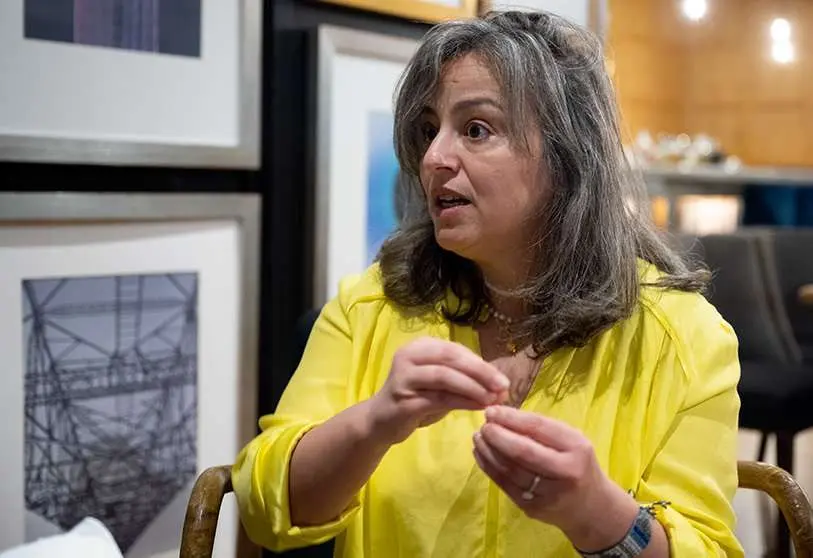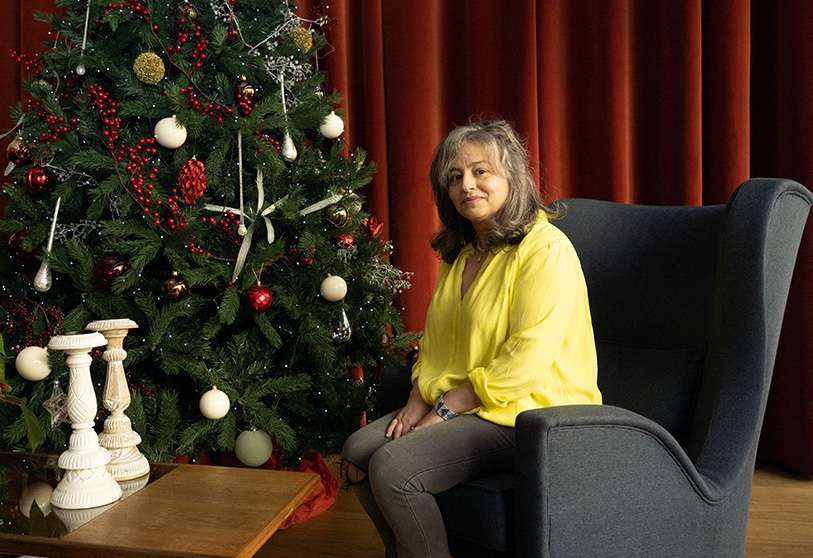Sabrine Hassen: "It is more than possible to rebuild a peaceful Libya"

Libya is facing a historic situation. The forthcoming democratic elections scheduled for 24 December are heralding a new scenario in which it is hoped that peace will reign and that the country will begin to lead a process of reconstruction. In this regard, there are already several companies that are closely monitoring the course of Libya in order to be able to invest in the vast opportunities it offers.
K2 Integrity's Managing Director of Risk Advisory and Research in London, Sabrine Hassen, gives us an overview of the new landscape that may emerge in Libya after the elections. Hassen has worked for many years in the MENA region where she has been leading several cross-border investigations to root out and identify fraud and corruption in the Middle East.
General elections are expected to be held in Libya next December. Are we at a "safe" moment in Libya for elections to be held?
At the moment the situation is calm in Tripoli, a little tense, but calm. During the next week we will know who the candidates are. Some of them do not meet all the requirements and that has meant that they are going through a judicial process, which is good because it ensures security.
Saif al-Islam has been eliminated because of his criminal record and has tried to make a back appeal. However, after the appeal was lodged, some militias tried to sabotage the court and his candidacy was readmitted. This strategy has been condemned by all other political sides so we can say that the situation at the moment is calm. I think the elections will go ahead. However, the big question for me is whether the results of the elections will be accepted the day after the elections.
That is my biggest fear, and if we go beyond that, then we will have the second round. I am confident that the elections will go ahead because we now have a unified government in which both sides have reached a kind of consensus.
The geopolitical situation has changed. For example, Qatar is now making a rapprochement between Saudi Arabia and the Emirates. Another example is Turkey as it is trying to talk to Egypt, so things are moving in the right direction.
I am optimistic, realistic, but optimistic. We will see the results on Christmas Day... for the moment the elections are going in the right direction.

What can we expect for the future of the region after the general elections?
Egypt has sided with one side. However, they understand that there will be no winners, so they will try to benefit from a peaceful Libya in which access to energy is allowed. They are talking about building a pipeline to Egypt, especially for gas and oil.
In Tunisia, for example, many Tunisians work in Libya and send money home. That helps socially. As for Algeria, the fact that there is a chaotic situation in Libya does not help Algeria, especially on the borders. If you remember the attack on the Nsala oil field, the terrorists came from Libya.
If Libya has a stable government, with a proper police and army, then those voters will be protected, so regionally the security of the country is crucial. Then there is the Sahel region, where we need the borders to be controlled to prevent refugees from using Libya to cross into Europe.
In the case of the southern countries, democracies are quite fragile at the moment. In Europe next May we will have elections in France. If refugees from Libya arrive in the country as a result of the political crisis, it could help populist governments in Italy, Spain or France to gain support. So it is in our interest regionally, especially in the Mediterranean, to control or make sure that Libya has the right structures in place to control the gangs that profit from human trafficking.
Once Libya is in a kind of reconstruction phase, people from sub-Saharan Africa could come and work in Libya. They could come and help. So, if they have work in Libya, there will be less incentive to cross the Mediterranean. As for Turkey, it can benefit economically from Libya rebuilding its infrastructure, roads, buildings, hospitals, hotels. They have realised that there will be no winners. You have to bet on having a unified country and start thinking about business instead of politics.

Do you think the elections could bring peace to Libya?
I might be naïve, but I am very optimistic. People before COVID were trying to organize a K2 conference in March, a conference to discuss the possibility of unifying and bringing the two sides together. Many people were skeptical, laughed and said this was a waste of time. A year later, no one knew that they would unite and agree on a prime minister, let alone talk about holding an election.
I am quite optimistic because the geopolitics have changed. The United States is not "America First", they now look at what is happening abroad and think that Africa has been neglected for many years. Countries like China, as well as Russia, have tried to take advantage of this.
On the other hand, Europe alone could not deal with this situation because they were not using the same weapons. It does not have a private military like Russia has. So Europe was not using the same tools. However, if we have an ally like the United States that suddenly takes an interest in what is happening in sub-Saharan Africa, I think that would bend the influence of the Chinese and the Russians.
And now Libya has an important security and intelligence network?
They have the help of many countries. It already has some tools on its own, but I know they are talking to some allies in Europe. That is good for Libya and its conflict. Libya is trying to talk to all countries. There will be international help because it is in the interest and especially in the interest of the regional neighbors to make sure that they are helping to track down people who might commit terrorist crimes in Libya or in the neighboring countries.

From your perspective, are you optimistic about Libya's future?
I am an optimist by nature, I have been in the crisis business and I have always tried to see the best in everything. I believe that not everything is catastrophic. We can't expect a country like Libya, which has suffered 42 years of dictatorship, to suddenly come out of a revolution and everything works and we love each other. It doesn't work like that.
This has also happened in Europe. We have the example of the French Revolution, after the revolution we had the government of terror of Roberspierre then the figure of Napoleon. Things need an adaptation and now I know that it is more accelerated. The fact that at least they are talking is a big step, a really big step, so I think it's going to be a shock after the elections. What they will make sure is that everybody benefits from the wealth that is going to be redistributed in a fair way and that every community, every region, is represented.
It is not going to be a case of one tribe having the power and deciding for everybody else. Everybody will get something. The country is very rich. It has the second or the first largest oil reserves in Africa. It's a big country, a small population, young people...many of them are very curious and look to Europe, they all look to Europe for inspiration.
We have reasons to be optimistic. It is a country that has the means to rebuild itself and after all, we are human. All we want is peace, to be able to educate our children, security, and that can be easily achieved now.
In Libya we don't have the religious division between Shia and Sunni. They don't have limiting religions so they can't use religion as an excuse to fight. They also don't have different languages, as they do in Iraq with Kurdish or Arabic. Everything is unified, they have more things that unite them than separate them.
We have to think that we can trust each other and we can share the wealth. Now the people who are governing or will govern are people who grew up with Gaddafi's dictatorship and still distrust each other.
Still, peace is coming and will come, and because of the interest and the proximity to Europe, the Union will help us.

Do you think Europe has an important role to play here?
Yes, we just had a meeting with a representative of the Ministry of Foreign Affairs. He started to list the countries that import and export the most, and the United States was not on his list. I was not surprised because Libya at that time was under sanctions, so the Libyans decided not to invest in the US.
It was very difficult for them to travel to the US so the only countries they travelled to and felt comfortable with were European countries. At that time, Dubai was not as developed as it is now and many of them have assets in the UK, in Malta, in Italy, because of the history, so they are familiar with Europe and they feel comfortable cooperating with Europe.
In terms of oil, Repsol is there. Libya doesn't have any US oil company. It did when it started, we had Chevron, Conoco Phillips... they left, but the Europeans stayed there. The sovereign wealth funds are in Europe, so I think Europe will totally benefit. If US companies come they have to start from scratch something Europe doesn't have to do.
Europe has three or four steps ahead and has to build on that. It is a very unique position.

The point is that Libya wants to be heard and wants to be listened to by the European Union...
Exactly. Europe is helping a lot and will continue to do so because we are neighbours. We have a common history, the best preserved Roman artefacts are in Libya, we have the Mediterranean, which belongs to us culturally, and a joint history. This cannot be ignored so Europe has a great advantage in this respect.
Also, Libya has vast resources, it has oil, it has gas, and the good thing is that they are starting from scratch.
You can start building with sustainable material, with green renewables. In a meeting attended by the company Repsol, they said they were aiming for 60% of fuels to have zero carbon emissions by 2050. Libya is a great place where they could invest in renewable energy, it's a great opportunity. We have to imagine that it is more than possible to rebuild a peaceful Libya.








